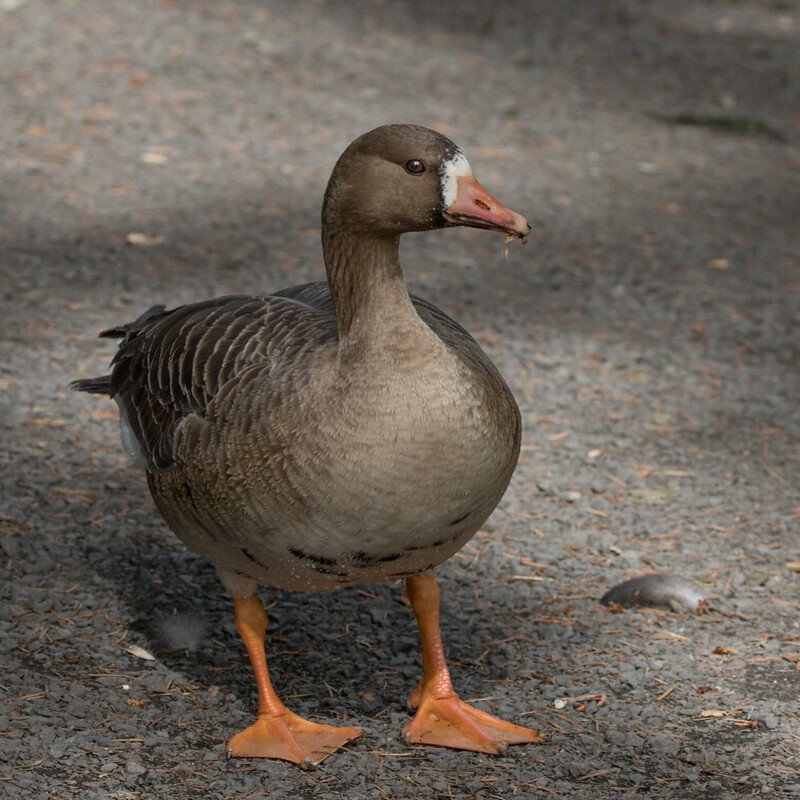The greater white-fronted goose (Anser albifrons) is a goose species related to the smaller lesser white-fronted geese. Albifrons are derived from the Latin albus “white” and frons “forehead.” It was previously referred to as the white-fronted goose in Europe; in North America, it is referred to as the greater white-fronted goose (or “greater whitefront”), a term that is gradually being embraced internationally.
Quick Overview: Anser Albifrons – Greater White-Fronted Goose
Body size: Around 26-34 in (66-86 cm) and a weight of 3599 g (126.98 oz)
Main colors: Orange, White, Black, Pink
Range: Throughout the United States
Migratory Bird: Yes
Best time of the year to see in the U.S.: March, April, May, September, October, November
Conservation Status: Least Concern
Greater white-fronted Goose Description
On adults, look for bright orange legs, a white face, and varying degrees of black splotching on the abdomen. The hue of the bill varies from orange to pinkish. Immatures lack a white face and a black belly, and their legs and bill have a duller orange color.

Size
These birds have a length of 26-34 in (66-86 cm) and a weight of 3599 g (126.98 oz). Their wings could range from 53-60 in (135-152 cm).
Feeding
The majority of white-fronted geese are herbivorous. They are herbivores, consuming grasses, grains, and berries. White-fronted geese have been observed feeding on mollusks and aquatic insects during the nesting season. White-fronted geese become exclusively herbivorous during the winter. Crops such as rice, soybeans, and cereals are consumed during the early winter trash. Their diet changes in late winter to include newly emerged grasses and forbs.
Habitat
The Greater White-fronted Goose is found in natural wetlands and agricultural fields throughout the temperate zone, from wet tundra, boreal forest mires, and coastal marshes to semi-arid grasslands, deserts, and mountain valleys in Mexico’s subtropics.
Behavior
The white-fronted geese are an opportunistic species. They have strong familial ties, which results in breeding cooperation. After breeding, white-fronted geese remain in groups of fewer than 30 individuals until they molt. Outside of the breeding and molting seasons, it is known that white-fronted geese congregate in big flocks of up to 30,000 birds. During migration, white-fronted geese have been observed flying at night
Anser Albifrons Scientific Classification
- Kingdom: Animalia
- Phylum: Chordata
- Subphylum: Chelicerata
- Class: Aves
- Order: Anseriformes
- Family: Anatidae
- Genus: Anser
- Species: Anser albifrons
Best time of the year to see
In the United States, the best time of year to see these birds are during the Spring season (March-May) and during the Autumn season (September – November).
Distribution of the Greater white-fronted Goose in the USA
Breeds in Alaska, far-northern Canada, and Greenland. Spends winters from coastal British Columbia to California, in New Mexico, and along the Gulf Coast in Texas and Louisiana; more rarely on the east coast and in the interior.
The Greater white-fronted Goose can be found in the following states in the United States – Alabama, Arizona, Arkansas, Colorado, Connecticut, Delaware, Florida, Georgia, Hawaii, Idaho, Illinois, Indiana, Iowa, Kansas, Kentucky, Maine, Maryland, Massachusetts, Michigan, Minnesota, Mississippi, Missouri, Montana, Nebraska, Nevada, New Hampshire, New Jersey, New Mexico, New York, North Carolina, North Dakota, Ohio, Oklahoma, Oregon, Pennsylvania, Rhode Island, South Carolina, South Dakota, Tennessee, Utah, Vermont, Virginia, Washington, West Virginia, Wisconsin, and Wyoming.
